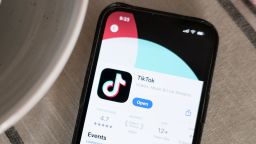The US government says that next month it can only pay about half of what low-income Americans are eligible for under a popular federal benefits program that is running out of money — a crisis that threatens to plunge millions of households into economic distress within weeks.
The announcement by the Federal Communications Commission reflects the first concrete impacts of Congress’ failure to extend the Affordable Connectivity Program, a pandemic-era benefit that provides monthly discounts on internet service to more than 23 million US households, including seniors, veterans and schoolchildren.
Due to lack of funds, April will be the final month the ACP can provide full benefits, the FCC said Tuesday. In May, the program will only have enough money to provide partial benefits before shutting down altogether. Next month, ACP subscribers can expect to receive only 46% of their usual benefit, the FCC said.
After that, program subscribers may have to pay hundreds of dollars more per year to stay online, or could potentially have to give up internet service entirely. Many ACP subscribers have told CNN that without help, they could have to choose between paying for internet and putting food on the table.
When Congress created the ACP in 2021, it promised qualifying low-income households a discount of up to $30 a month on internet service, or $75 a month for households on tribal lands. It funded the program with a one-time infusion of $14 billion.
Now, that money is running out, and Congress has yet to extend the program. The Biden administration has blamed congressional Republicans for standing in the way of legislation that could renew the ACP and ensure Americans aren’t hit by higher bills. House Speaker Mike Johnson has declined to say whether he backs that legislation, while Senate Majority Leader Chuck Schumer has said he supports passage of additional ACP funding. The ACP is popular with Americans across the ideological spectrum, surveys show.
On Wednesday, a bipartisan bill to approve $7 billion in new funding for the ACP gained two Senate sponsors: Ohio Democratic Sen. Sherrod Brown and Kansas Republican Sen. Roger Marshall. The Senate bill now has five cosponsors, while the House version is backed by 223, more than half of the members in that chamber.
Internet service providers (ISPs) could still step in voluntarily to close the gap for the millions of Americans potentially affected by the end of the program, the FCC said Tuesday.
“We encourage providers to take efforts to keep consumers connected at this critical time,” the agency said, adding that ISPs could offer their own discounts, shift consumers onto proprietary low-cost internet plans or take other steps to ensure low-income Americans’ service is not interrupted.
CNN is reaching out to major internet providers for comment on the FCC’s call for those voluntary measures.






